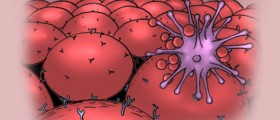
Esophageal cancer and gastric cancer are both malignant tumors affecting upper portion of the gastrointestinal tract. They may sometimes have similar clinical characteristics but they actually originate from different organs, act differently and are also treated differently. However, no matter what cancer the person is suffering from (esophageal cancer or gastric cancer), the best results of treatment are achieved only if the disease is diagnosed in early stages.
More about Esophageal Cancer
This malignant tumor usually affects lower portion of the esophagus, may occur without previous damage to the organ or is a consequence of chronic irritation of the esophagus caused by stomach acid (gastroesophageal reflux disease and Barrett's esophagus).
Esophageal cancer is reported more in men, obese people as well as heavy smokers and people who consume alcohol beverages on a daily basis.
In most cases cancer is histologically classified as adenocarcinoma. Once the tumor progresses, it spreads to regional lymph nodes or infiltrates the nearby organs, most commonly the trachea.
As far as symptoms and signs of esophageal cancer are concerned these include dysphagia, odynophagia, pain in the chest, heartburn and appetite/weight loss.
Treatment for esophageal cancer is mostly surgical, when a portion of the organ affected by the tumor as well as regional lymph nodes are resected. After surgery patients may undergo radiation therapy while chemotherapy is reserved for advanced stages of the disease as well as inoperable patients.More about Gastric Cancer
Similarly to esophageal cancer, most gastric cancers are adenocarcinomas as well. This tumor may grow anywhere inside the stomach.
The risk for developing gastric cancer is high in people with a family history or gastric cancer, those with previous infection caused by Helicobacter pylori, patients with a history of pernicious anemia and chronic atrophic gastritis as well as those who have had an adenomatous gastric polyp larger than 2 cm. Smoking also contributes to gastric cancer as well as consumption of smoked, salted, pickled foods and alcohol consumption.
Symptoms and signs of gastric cancer are abdominal fullness/pain, excessive belching, loss of appetite, nausea and vomiting. Progression of the disease is associated with difficulty swallowing especially in terminal stage, general decline in health, weakness/fatigue and weight loss. Finally, patients may lose blood via stool or sometimes even vomit blood.
The only way to cure patients and to somehow bring the disease under control is by surgical removal of the stomach (gastrectomy). Additional treatments are chemotherapy and radiation therapy although this cancer seems to be unresponsive to most available protocols.

















Your thoughts on this
Loading...